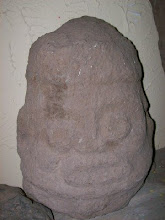

Last Monday May 18th. it started a Meeting of Afrodescendants that arrived to South Americas during colonial times. During three days they had the possibility to share the situation of afrodescendants in Bolivia and in other countries. In the bolivian case, the State Constitution approved last January 25th, 2009 recognizes all the rights of the afrobolivian people. I was something expected for a long time by afrobolivian because they were never included before in any Constitution, what is more, during the last census in 2001 there were not taken into account.
Yesterday, President Evo Morales, went to Chijchipa, one of the communities mainly inhabited by afrobolivians. There, he assured that in the next Plurinational Assembly afrobolivians would be included. Other important step is that since last March, an afrobolivian woman, Mónica Rey, for the first time in the history of Bolivia is responsible of a Direction that works towards the elimination of Racism and Discrimination.
There are different tools that afrodescendants have been using in order to ask for their rights. In Bolivia, it has been music and dance. As soon as they play their music, people accompanies them dancing. As afrobolivians say, they have opened doors with their art.











